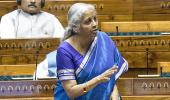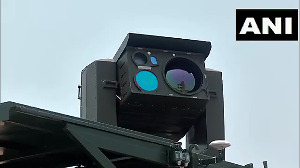Finance Minister Nirmala Sitharaman on Saturday said she is likely to introduce the new income tax bill, which will replace the six-decade-old I-T Act, in the Lok Sabha in the coming week.

After introduction in the Upper House, the bill will be sent to a parliamentary standing committee for scrutiny.
The Union Cabinet, chaired by Prime Minister Narendra Modi, approved the bill on Friday.
"Yesterday, the Cabinet cleared the New Income Tax proposal, I hope to have it introduced in the Lok Sabha in the coming week.
"Post that it will go to a committee," Sitharaman said a media briefing after addressing the post-Budget customary meeting with the central board of directors of the Reserve Bank of India (RBI).
The bill will again go to the Cabinet after the parliamentary committee gives its recommendations on it.
After Cabinet approval, it will again be introduced in Parliament.
"I still have three critical stages to pass through," Sitharaman said to the query regarding rollout of the new income tax law.
Sitharaman had first announced a comprehensive review of the Income-Tax Act, 1961 in the July 2024 Budget.
The CBDT had set up an internal committee to oversee the review and make the Act concise, clear, and easy to understand, which will reduce disputes, litigations, and provide greater tax certainty to taxpayers.
Also, 22 specialised sub-committees have been established to review the various aspects of the Income Tax Act.
To another question, the Finance Minister said the last week's Budget announcement on customs duty rationalisation is a work that has been on since the last two years.
"So we had rationalised some even two years ago. We also set certain norms saying evergreening is not going to happen on anti-dumping duties, which had played a big role in giving some kind of a protection for India's own manufacturing capabilities," she said.
Sitharaman further said with every such expiry date getting closer, the government will review it thoroughly, and only in exceptional cases duties will be extended, but most often they should be concluded so that the protection does not become a perpetual protection.
"So, this is an ongoing process. We want to make India a lot more investor-friendly, trade friendly, and at the same time, balance it with Aatmanibhar Bharat where we need to have production, particularly through the MSMEs.
"We will provide the tariff protection as required by the industry," the finance minister, who presented her eighth straight Budget on February 1, said.
In her Budget speech, Sitharaman had announced rationalisation of customs tariff structure for industrial goods.
As part of comprehensive review of customs rate structure announced in July 2024 Budget, on February 1, 2025 she proposed to remove seven tariff rates.
This was over and above the seven tariff rates removed in the 2023-24 Budget.
There will be now only eight remaining tariff rates, including 'zero' rate.











 © 2025
© 2025